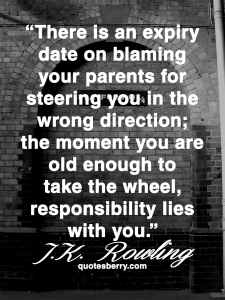
What I am about to discuss are the ideas that make me fall on my knees daily and say, “Dear God forgive me for my part in causing the downfall of our culture.”
This article, and the one that follows, is more about late Baby Boomers’ and Generation X’s parenting than about the Millennials. The posting of this article marks the beginning of my twenty-ninth year of working with students and parents in teaching, counseling, administration, public speaking, and consulting. Although no one announced it at the time, in 1987 I was beginning a career as a member of Generation X when the group now called the Millennials was being born. Members of the group have been my clients, students, friends, employees, and children. This is the group that has been parented by my generation and those at the end of the generation before me. This is the group that has grown up with technology that I never guessed would be possible in my lifetime. This is the group that many, including myself, have maligned for being entitled, self-absorbed, egotistical, demanding, and just plain ol’ too big for their britches. They have been accused of seeking out increasingly liberal ideas cut into sound bites and resisting the move from adolescence to adulthood. But that’s not all of who they are. They can also be hesitant to accept statements at face value and extremely loyal. They don’t hold back any punches. More and more, I tend to believe that my generation and our parenting has contributed to this generation’s characteristics. Where we have acted at all, we have affected them in a negative way; where we have ignored them, we’ve made them stronger people. We failed.
I want first to address three major caveats:
- I know that any time we talk about an entire group of people, we are generalizing. If you were born between the mid 1980’s and the early 2000’s, you may have nothing in common with your generation. When I read Douglas Coupland’s Generation X: Tale for an Accelerated Culture, I thought, “This is so like me. Kinda.” I didn’t identify with the stereotypes completely. However, I do think there are advantages in exploring trends, even if those trends are not microscopically descriptive. Viewing from a distance can help us see the bends in the road.
- No one can blame any parent for the life they have been dealt. That’s not the reason for my writing this article. As the clip above illustrates, adults are responsible for themselves. I’m against the victim mentality. I’m pointing out what I see as the state of affairs and how I think we can stop it from happening again.
- Most importantly, this article is not based on research. Yes, I am pontificating. My experience is with suburban, American Caucasian, African American, bi-racial, and Hispanic young people and their families. While trying to be fair, I cannot be unbiased. Sorry, Fox News, it’s not possible. We all have our biases. I’m basing this on what I’ve seen changing.
The parents of the Millennials, the late Baby Boomers and Gen Xers, took the economy, job market, and societal pillars, balled them up in a mangled ball, and tossed them to the Millennials. Now, that they have not performed as we would like, we scold them when we were the ones who fostered the good, the bad, and the ugly in what they now are. What are the seeds, what manure did we give them, and how have they grown today? Here are just a few pieces of the stereotype.
- They are entitled, sniveling brats. We fed them constantly with assertions that success was not based on character or action; it was simply based on being. We gave them awards for participation so that everyone would be happy. We and a purple dinosaur taught them that fair equals equality, and that love alone will cure all problems, and that they should raise their voices and demand what is owed to them. We forced them to make decisions on everything from their clothing styles to the school they go to at ages when they could not possibly no what is good for them. We demanded that everyone be “relevant” to them and constantly changed church, school, and home so that messages to them are accepted and palatable instead of expecting them to adapt to the world around them. Reading became tedious and worship became fun. (You remember when Jesus asked us to be fun, don’t you?) Now we complain about the starting salary our twenty-two year old interviewee demands, and whine that he/she expects the world to revolve around them.
- They are lazy, and would rather mooch off their parents than forge their own careers and lives. We have bulldozed over every teacher that held them accountable, bought them everything we could possibly afford with the lie that “I want them to have what I didn’t have at that age” when it was actually our parental guilt that we were assuaging. We allowed them to “find themselves” on our dime, and then we complain to our peers when they move back into our basements at thirty.
- They have the attention spans of ants and are tied to their technology in an addictive way. Not having incorporated ideas about technology into our theological and psychological worldviews, we became amazed and addicted to the changes that caught us off guard. We shared the fascination with our children and found that technology makes a wonderful and inexpensive babysitter. In front of a screen, their minds were programmed to accept thoughts in small colorful bits. We sent them off to school, telling the teachers to please find more entertaining, mesmerizing and “relevant” forms of teaching. Then we texted them in school to make sure that they were not lacking in anything they may have wanted, illustrating that we were just as fascinated by our technology as they were and that we adored them so much we lived vicariously through them.
- They are not drawn to a meaningful worldview, but have followed the Pied Piper of entertainment off the theological/philosophical cliff. In short, they can’t think argumentatively. We introduced our children to technology at an age before they had adequately formulated language skills because government schooling told us this was an important life skill, more important than the antiquated strengths of debate and reasoning. We failed to articulate the connection between popular culture and worldview, demonstrating a passive view of life. We cared more about our families’ financial gains than we did about what our families believed. In other views we taught them that it is the what that matters more than the why.
- They stand up to hypocrisy, and won’t take a person’s statements at face value. It is a wonderful characteristic that they have. I love them for it. But it was caused by what we didn’t do right. They don’t stand for hypocrisy because we showed it to them their entire lives. We taught them that sin is simply mistake, that our contradictions are covered by easy grace, and that children are too naïve to realize when adults have it all mixed up. Now we applaud them for their desire to right wrongs unless the wrong is us.
What can we do? Will the late Gen Xer and the Millennial raise a generation that is more of the same? We’ll discuss that next time. For now the blog is so long that no one has the attention span to finish it.


